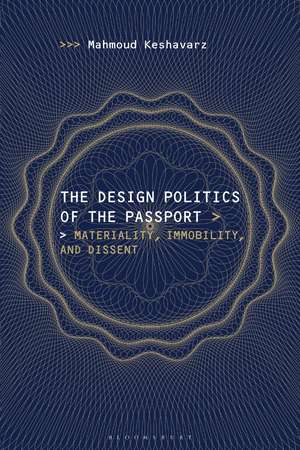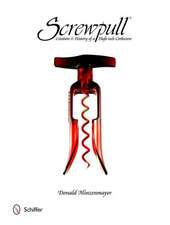The Design Politics of the Passport: Materiality, Immobility, and Dissent
Autor Mahmoud Keshavarzen Limba Engleză Hardback – 12 dec 2018
| Toate formatele și edițiile | Preț | Express |
|---|---|---|
| Paperback (1) | 148.58 lei 6-8 săpt. | |
| Bloomsbury Publishing – 19 feb 2020 | 148.58 lei 6-8 săpt. | |
| Hardback (1) | 655.00 lei 6-8 săpt. | |
| Bloomsbury Publishing – 12 dec 2018 | 655.00 lei 6-8 săpt. |
Preț: 655.00 lei
Preț vechi: 942.24 lei
-30% Nou
Puncte Express: 983
Preț estimativ în valută:
125.33€ • 131.21$ • 103.71£
125.33€ • 131.21$ • 103.71£
Carte tipărită la comandă
Livrare economică 05-19 aprilie
Preluare comenzi: 021 569.72.76
Specificații
ISBN-13: 9781474289399
ISBN-10: 1474289398
Pagini: 144
Ilustrații: 10 BW illus
Dimensiuni: 156 x 234 x 15 mm
Greutate: 0.42 kg
Editura: Bloomsbury Publishing
Colecția Bloomsbury Visual Arts
Locul publicării:London, United Kingdom
ISBN-10: 1474289398
Pagini: 144
Ilustrații: 10 BW illus
Dimensiuni: 156 x 234 x 15 mm
Greutate: 0.42 kg
Editura: Bloomsbury Publishing
Colecția Bloomsbury Visual Arts
Locul publicării:London, United Kingdom
Caracteristici
Draws on fascinating research into such practices as the making and circulation of forged passports
Notă biografică
Mahmoud Keshavarz is a postdoctoral researcher at the Engaging Vulnerability Research Program, Department of Cultural Anthropology, Uppsala University, Sweden.
Cuprins
1. Introduction: Design, politics and the mobility regimeThe politics of design and the design of politicsBeyond a representative deviceMobility regimes: practices, performances and articulationsTravellers without the 'right' papersPassport situations2. HistoriesHaving the 'right' paperThe danger of moving actorsKnowing the unknown at distanceThe agent of empireTechnologies of racialization and genderingStateless by passportRedesigning by stampsPassports of the unitedSame technologies, different power3. PowerObjectsPolitical ecologiesBodiesTechnologiesEconomiesInterfacesManipulations4. PassportingMaterialitiesI: how thick is your passport? II: If one can make a passport, one can remake it tooSensibilitiesI: I have not seen such a passport before! II: today, you are going to be a South Korean! Part-takingI: I am a citizen now! II: I have flushed down my passportTranslatingI: where does this passport come from? II: who speaks Hebrew? 5. DissentCriminalization of migration brokeryDifferent brokers of the mobility regimeMigration brokers of the world, unite! We police the policeForged passports as material dissentsCritical designers of the mobility regimeThe violence of material critique6. The design politicsAn articulatory practiceVulnerability of designEthics of design NotesReferencesIndexAcknowledgements
Recenzii
Keshavarz makes a series of important points about postcoloniality, race, and gender in determining the privileges and prejudices intertwined in the act of travelling across borders.
Essential reading for those engaged in global design history and related fields such as politics and sociology ... Keshavarz is to be commended for an engaging and provocative book that succeeds in communicating historical and contemporary experiences of migration, as well as illuminating critical issues that are largely underrepresented in design history.
Mahmoud Keshavarz's original and evocative book, The Design Politics of the Passport, blasts conventional design studies out of the water, brilliantly exposing design's role in making a world that contains and controls certain subjects more than others.
In this provocative book, Mahmoud Keshavarz puts into question reigning notions of critical design, national identity, illegality, forgery, and much more. He does this by unravelling a seemingly mundane designed artefact: the passport, shifting attention from the design of passports to what passports design as they act in the world. As such, this is an exemplary study of ontological designing in action, and an important book for thinking the inter-relation of design and politics. The sharp theoretical analysis is grounded in, and enriched by, case studies of the effects of regimes of passporting on individual lives. The Design Politics of the Passport is timely in its address to the uneven distribution of rights of movement in a world where political, economic and climatic catastrophes are compelling increasing numbers of people to be on the move.
In this exciting and conceptually ambitious study, Mahmoud Keshavarz gives new meaning and substance to such well established concepts as the production of space and the diagram of power. By examining with incisive care and precision the co-articulations of space and power through the artefact of the passport, this book's interrogation of the politics of design and the design of power offers a refreshing and path-breaking perspective on the materiality of bordering and im/mobiilty.
Essential reading for those engaged in global design history and related fields such as politics and sociology ... Keshavarz is to be commended for an engaging and provocative book that succeeds in communicating historical and contemporary experiences of migration, as well as illuminating critical issues that are largely underrepresented in design history.
Mahmoud Keshavarz's original and evocative book, The Design Politics of the Passport, blasts conventional design studies out of the water, brilliantly exposing design's role in making a world that contains and controls certain subjects more than others.
In this provocative book, Mahmoud Keshavarz puts into question reigning notions of critical design, national identity, illegality, forgery, and much more. He does this by unravelling a seemingly mundane designed artefact: the passport, shifting attention from the design of passports to what passports design as they act in the world. As such, this is an exemplary study of ontological designing in action, and an important book for thinking the inter-relation of design and politics. The sharp theoretical analysis is grounded in, and enriched by, case studies of the effects of regimes of passporting on individual lives. The Design Politics of the Passport is timely in its address to the uneven distribution of rights of movement in a world where political, economic and climatic catastrophes are compelling increasing numbers of people to be on the move.
In this exciting and conceptually ambitious study, Mahmoud Keshavarz gives new meaning and substance to such well established concepts as the production of space and the diagram of power. By examining with incisive care and precision the co-articulations of space and power through the artefact of the passport, this book's interrogation of the politics of design and the design of power offers a refreshing and path-breaking perspective on the materiality of bordering and im/mobiilty.
















